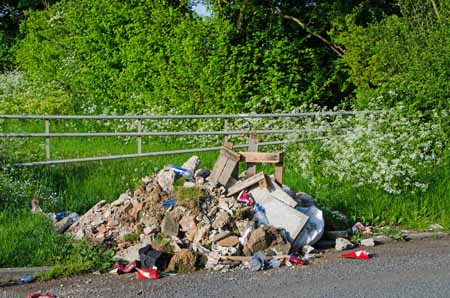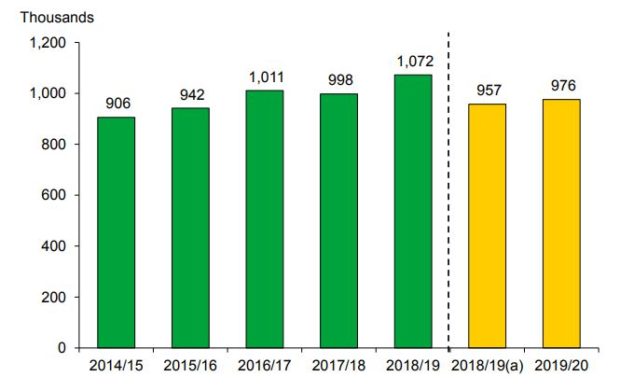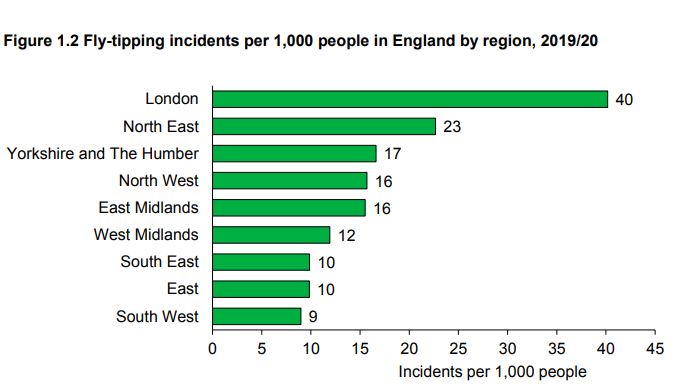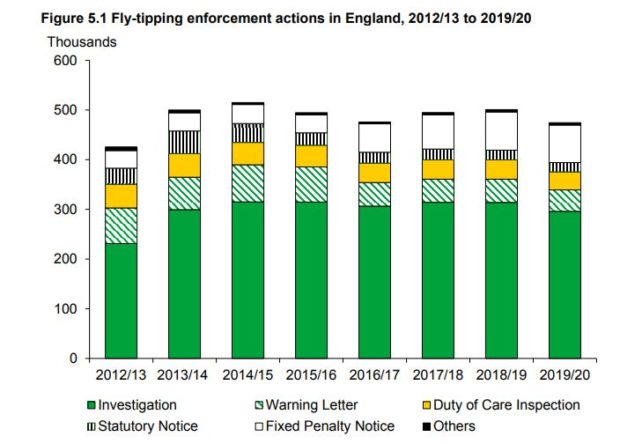The data, based on incidents and actions reported through WasteDataFlow, shows that a total of 976,000 fly-tipping incidents were recorded in 2019/20, up from 957,000 in 2018/19.

Of these, 65% involved household waste, with 632,000 incidents recorded, a 7% rise.
However, only the last week of the 2019/20 reporting period (23–31 March 2020) coincided with the national lockdown commencing on 23 March.
Therefore, Defra says it does not expect to see a noticeable impact of Covid-19 in the 2019/20 fly-tipping statistics.
The most common place for fly-tipping to occur was on highways (pavements and roads), which accounted for more than two fifths (43%) of total incidents in 2019/20. In 2019/20, the number of highway incidents was 419,000, which was an increase of 6% from 396,000.

The figures above were slightly revised in 2018/19 after Defra said it was aware of a few local authorities who were not reporting all incidents or who had changed their basis of reporting.
To improve transparency in the reported data, Defra says it added an additional question to WasteDataFlow to cover all incidents. This includes customer/public reported and those reported by and pro-actively cleared by contractor crews. This is the higher 2018/19 data, but it is not comparable with other years.
Defra said: “Many local authorities have changed the way they capture and report fly-tips over the past few years, so the changes over time should be interpreted with some care. Defra is also aware that the definitions used to describe fly-tips in the guidance are interpreted broadly by local authorities.”
Regions
In 2019/20 there were on average 17 fly-tipping incidents per 1,000 people in England. London had the highest average number of incidents per 1,000 people at 40, while the South West had the lowest at 9 incidents per 1,000 people.

Enforcement
In terms of enforcement, local authorities carried out 474,000 enforcement actions in 2019/20, a decrease of 26,000 actions (5%) from 501,000 in 2018/19.
The number of fixed penalty notices issued was 75,400 in 2019/20, a decrease of 2% from 77,000 in 2018/19.
Meanwhile the number of court fines issued increased from 2,056 to 2,671 in 2019/20, with the value of total fines increasing to £1,170,000, an increase of 7% on the £1,090,000 total value of fines in 2018/19.

Defra said in the data set that it should be noted that multiple actions can sometimes be carried out on one particular incident.
Total enforcement costs have not been estimated for 2019/20 as accurate costs are not available for the majority of enforcement categories.
Cost
In 2019/20, 33,000 or 3% of total incidents were of ‘tipper lorry load’ size or larger, which is a decrease of 8% from 36,000 in 2018/19. For these large fly-tipping incidents, the cost of clearance to local authorities in England in 2019/20 was £10.9 million, compared with £12.8 million in 2018/19.
Cost data is only published for clearance costs for ‘tipper lorry load’ and ‘significant/multi load’ incident categories and enforcement costs for ‘prosecutions’ and ‘injunctions’ action categories, which are reported directly by local authorities.
Responsibility
Defra said as part of the data release that local councils and the Environment Agency both have a responsibility in respect of illegally deposited waste.
“Local councils deal with most cases of fly tipping on public land, whilst the EA investigates and enforces against the larger, more serious and organised illegal waste crimes. This publication summarises the number and type of incidents of illegally deposited waste, the cost of dealing with them and the actions taken against fly tipping in England.”











Subscribe for free